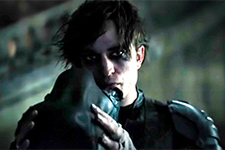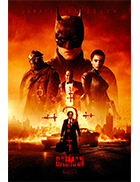The Batman
|  Matt Reeves’s The Batman is the latest reinvention of the vigilante comic book character who was first created by Bill Finger and Bob Kane for Detective Comics back in 1939. Batman’s subsequent screen depictions have ranged widely, from the campy absurdity of the late 1960s TV series, to the brooding Gothic weirdness of Tim Burton’s 1989 movie, which is arguably the origin point for the modern comic book film. Burton’s quirky-dark vision of Batman quickly gave way to Joel Schumacher’s neon-candy kitsch, which was soon obliterated by Christopher Nolan’s politically attuned, philosophical Dark Knight (2005–2012) trilogy starring Christian Bale, which remains the silver-screen Batman by which all others are judged. It was only a few years later that Batman appeared again, this time in Zack Snyder’s Justice League series (2016–2017) played by Ben Affleck as an older, cynical superhero. Affleck was originally slated to direct and star in his own stand-alone Batman film, but he eventually backed out, first as director and then as star, thus sending the producers back to the drawing board. And that is probably a good thing, because Reeves’s film discards much of the overstuffed, dreary high style and hollow characters that made Snyder’s films so heavy and instead goes back to basics, returning Batman to the detective-mystery genre from which he originated (which also explains the addition of the article “The” before his name, which is how he was originally introduced to readers). The Batman is not all reinvention—not by any stretch, as there is plenty that is familiar here, including the generally dark atmosphere and air of seriousness—but Reeves does enough with the character and all that goes with him to make it feel relatively new, even if the film’s three-hour running time isn’t entirely earned. Written by Reeves and novelist-turned-screenwriter Peter Craig, who previously cowrote Ben Affleck’s heist thriller The Town (2010), the last two films in The Hunger Games series, and The Unforgivable (2021), The Batman begins en media res, with no backstory as to how billionaire Bruce Wayne (Robert Pattinson) became the cowled detective known as The Batman; there are bits and pieces sprinkled throughout the narrative, with numerous references to Wayne’s parents, their involvement in business and politics in the fictional Gotham City, and their murders, but otherwise this is in no way an origin story like Nolan’s Batman Begins (2005). The sprawling narrative centers on a series of high-profile murders of prominent Gothamites, including the mayor and the district attorney, by a creepy masked vigilante calling himself The Riddler (Paul Dano). Despite distrust from virtually everyone in law enforcement, Batman works with Lt. James Gordon (Jeffrey Wright), who recognizes his unique talents and abilities, even as he tries to keep him working within the confines of procedure and the law. The investigation gets tangled with Gotham’s organized crime scene, which is run by Carmine Falcone (John Turturro) and his righthand man, Oz, aka Penguin (Colin Farrell, unrecognizable beneath pounds of latex). Also in the mix is Selina Kyle (Zoë Kravitz), who works in one of Falcone’s nightclubs and is trying to solve the disappearance of one of her friends, who is also of interest to Batman’s investigation. Thus, we have three vigilantes—Batman, the Riddler, and Kyle, who soon becomes known as Catwoman—working against each other in their various pursuits, although Batman and Catwoman’s interests align enough that they are more partners than adversaries. Reeves, who graduated from the ranks of television with the J.J. Abrams-produced found-footage creature feature Cloverfield (2007), the moody adolescent-vampire remake Let Me In (2010), and the last two entries in the Planet of the Apes series reboot (2014, 2017), is a natural fit for the material, as he grounds the story in a sense of noir-ish realism that still leaves room for some high style. Dano’s Riddler is one of the film’s more inspired inventions, as the character is rooted in a sense of grotesque righteousness gone so mad that it has become murderous. Dano, once unmasked, is an almost pathetic figure, especially in his raving disappointment that Batman does not go along with his plans in revealing the sordid depths of corruption in the city, but under his mask and goggles he is a horror-movie monster for the digital age, broadcasting his crimes as a wake-up call for a tired populace inured to corruption. As Batman/Bruce Wayne, Pattinson is effective enough (he was one of the better Batman chins of late), although I couldn’t help but feel a twinge of disappointment with how the film treats the character when he isn’t wearing the cowl and speaking in ominous tones. With his long dark hair, pale face, and running black eye make-up that looks like dripping spray paint (this is the first film to actually address what all that black around Batman’s eyes would look like after a long night prowling the streets), Pattinson’s Bruce Wayne comes across more like a ’90s emo kid than a psychologically driven avenger. Pattinson overplays Wayne’s hurt, which is his defining characteristic when out of uniform; as Batman, he is hard, determined, and in charge, but as Wayne he is like a wallflower, rarely making public appearances and struggling to make eye contact. His relationship with Alfred (Andy Serkis) is similarly diffuse even though Alfred’s getting wounded late in the film is intended to play as a major emotional charge. Shot by cinematographer Greig Fraser, who recently won an Oscar for his work on Denis Villeneuve’s Dune (2021), The Batman is a visually impressive film of shadow and shallow focus; it looks more like a graphic novel than any Batman film since Burton’s, but it still maintains a sense of physical verisimilitude. Gotham City is designed, but not so much that it ceases to look like something from our experience. The film also dials down the technology, for example, outfitting Batman with a vehicle that looks more like a functional SUV than some elaborate comic book creation, although he does get to use a pair of contact lenses that double as streaming video cameras (like our current technology, the coolest stuff is also the smallest). There is still plenty of derring-do and vertiginous moments of near death and escape, but The Batman is more procedural than action movie, a kind of DC Universe version of Seven (1995). The violence is sometimes brutal, especially since The Riddler uses it as part of his message, but it works within the larger flow of the narrative and the importance it places on the brutality of criminality. The best thing The Batman does, though, that so many similar films have failed at in recent years, is establish a series of characters who could conceivably appear in future installments without feeling like the whole film is just a big set-up. Copyright © 2021 James Kendrick Thoughts? E-mail James Kendrick All images copyright © Warner Bros. / DC |
Overall Rating: 

 (3)
(3)


